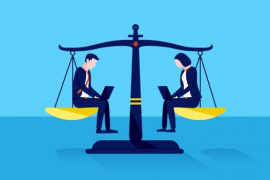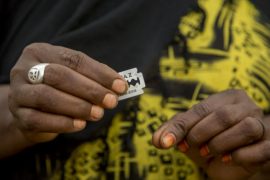In light of the Gender Equality Forum 2017, Helle Bank Jorgensen, President of the Global Compact Network Canada (GCNC), sat down with Paul Polman, Unilever CEO for an interview and asked the following questions on Gender Equality, Women’s Empowerment, and more.
Helle: Why is Gender Equality important to you and Unilever?
Paul: Addressing barriers to gender equality is not just the right thing to do, it’s also vital for our future growth. We at Unilever consider the respect and promotion of women’s rights and the advancement of women’s economic inclusion both a human right as well as a business priority. By promoting the formal and active participation of women in the economy, we aim to transform lives, families, communities and economies. Globally, it is acknowledged that empowering women economically creates a ripple effect on families, communities and economies. In turn, we have the opportunity to grow our markets, brands and business.
Women control 65% of consumer spending and are the fastest growing group of consumers. Building trust in our brands among our largest consumer base is critical – women account already for more than 70% of our sales, and they play essential roles in our extended value chain where we engage them as growers, distributors, and factory and office employees.
Helle: Are you optimistic that we will get to Gender Equality 2030?
Paul: “The Global Commitment to gender equality has never been stronger” so claims the United Nations High Level Panel on Women´s Economic Empowerment, reflecting that nearly 200 governments around the world have for the first time in history signed up to a concrete goal for achieving gender equality and empowering all women and girls, as part of the 2030 Agenda for Sustainable Development.
At Unilever, we share this commitment.
Having said that, Gender Equality seems to remain a distant goal. According to the World Economic Forum [Global Gender Gap Report: http://reports.weforum.org/global-gender-gap-report-2016/], gender parity has got worse, not better in 2016 and won’t be reached for another 170 years.

However, I am convinced that empowering women and girls represent the single biggest opportunity for human development and economic growth. Investing early in the lives of women and providing girls with just one extra year of secondary education can increase a girl’s potential income by 15-25%. Equality for women in the labour force would add US$28 trillion to the global economy by 2025 [McKinsey Global Institute]. Greater equality and women’s empowerment will lead to investment in education and agriculture, in turn leading to long-term economic growth and therefore business opportunity.
This argument will help to advance the gender equality agenda further but closing the gender gap will require further cross-sector collaboration to remove barriers holding women back to participate in social, political and economic life. Business has both a critical role to play to advance the women´s agenda but equally a clear business interest. This is what keeps me optimistic – and why I am engaged to actively encourage business leaders to create solutions and go from ‘talking the talk’ to ‘walking the talk’.
We cannot wait another 170 years for equality and the world can’t afford to.
Addressing barriers to gender equality is not just the right thing to do, it’s also vital for our future growth.
Helle: What will it take to achieve Gender Equality by 2030? / Why is it so difficult to achieve Gender Equality?
Paul: There is mounting evidence that addressing gender equality is not only the right thing to do it is also a smart thing to do. However, addressing gender equality is a multi-faceted challenge, and persistent gaps remain. Despite advancement in education, rising incomes closing the gap remains a distant goal. The High-Level Panel on Women has rightly pointed out overarching systemic constraints to women´s economic empowerment – one of them is ‘Addressing adverse social norms’. Our own research confirms that some of the strongest forces perpetuating gender gaps are harmful social norms and stereotypes.
Given Unilever is a leading consumer goods company serving billions of consumers every day and the second largest advertiser in the world, we have developed an understanding of the drivers and motivations – the norms that lie behind people´s behaviours.
We now want to take that experience and work to another level. Together with others, we want to challenge outdated, discriminatory social norms and stereotypes that impede opportunities for women across our value chain and society.
We believe the impact on gender equality can be transformational by helping to challenge these limiting social norms and gender stereotypes affecting women and holding back global economic growth and social progress that will come from increased gender equality and women’s empowerment.
A striking finding in our research was that 75% of respondents agreed that we, as senior leaders, have the greatest responsibility to step up and take action. Addressing underlying unhelpful stereotypes is an important step to making real progress towards achieving gender parity, but it requires new styles of business leadership.
It will remain the biggest challenge to engage leaders in changing their own leadership, which is often influenced by unconscious biases, outdated norms, and often fear.
We are committed to empowering 5 million women by 2020 across our entire value chain – in our workplace, supply chains, the communities we serve, and through using the power of our brands.
Helle: What actions and achievements (yours or Unilever´s) related to achieving Gender Equality are you most proud of?
Paul: It’s difficult to state a specific action that I’m proud of – what I’m probably most proud of is how our holistic ‘Opportunities for Women’ strategy as shorthand to encompass the different dimensions of gender equality and empowerment, including access to rights, skills, resources and jobs and livelihoods. We are committed to empowering 5 million women by 2020 across our entire value chain – in our workplace, supply chains, the communities we serve, and through using the power of our brands.
We’re focusing on our internal practices as well as how we can support the women in our supply chain, and through our brands, our consumers. To date, we have improved our gender balance, with the proportion of female managers reaching 45% in 2015. In partnership with others, by 2015 we had enabled around 800,000 women to access initiatives that aimed to develop their skills: 70,000 Shakti micro-entrepreneurs in India and around 730,000 women on tea small holdings in Kenya and India.
Helle: Do you have any advice to other business leaders that don’t know where and how to
start?
Paul: All organisations and governments have a role to play to help close the gender gap and businesses needs to be part of the solution. Every company has a role to play to embed women’s empowerment within their own strategic and business goals. This requires all of us to improve our understanding of the influence we can bring to bear across our value chains – from corporate policies and practices we adopt internally (e.g. equal pay) to making the financial and business case to others externally.
Business leaders cannot and should not operate in isolation and seek support through powerful partnerships and dialogues with other businesses and multi-stakeholder programmes. This is why we are mobilizing business leaders to for examples sign up to the WEPs (Women´s Empowerment Principles) and to join initiatives such as the High-Level Panel on Women to develop inclusively and sustainable approaches.
Helle: As a bonus question, please nominate another leader that you would like us to interview.
Paul: There are many impressive and passionate leaders within the business world, governmental and non-governmental organizations and within civil society. I have the pleasure to work with many of them within our own organization, through initiatives such as the HeforShe movement, through our many partnerships like for example with the Executive Director of UN Women Phumzile Mlambo-Ngcuka. Recently, I admired the leadership of Ms. Simona Scarpaleggia, Ikea in the UN High-Level Panel and the high profile results of the findings that came out of the report. We look forward to being involved with the working groups.
Source: globalcompact.ca



